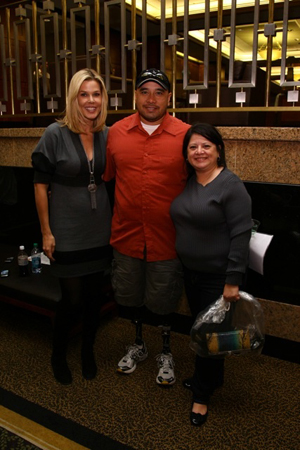
Mary Alice Stephenson, fashion and beauty expert who coordinated the event, with wounded veteran Daniel Robles and his caregiver, Ernestine.
By Terri Pous
When soldiers are injured in combat, the healing doesn’t stop in the hospital. After they return home, the reality sets in. Whether they suffer physical injuries or the effects of post-traumatic stress disorder (PTSD), their caretakers and loved ones share their struggle.
Bob Woodruff’s wife Lee knows understands this all too well. Less than a month after he was named anchor of ABC World News in January 2006, her husband was critically wounded by a roadside bomb in Iraq. During the recovery process, the Woodruffs formed the Bob Woodruff Foundation, which has hosted the Stand Up for Heroes benefit in New York for the past five years to honor injured service members.
The annual event features performances by musicians and comedians, but this year’s run offered something extra for the attending veterans’ caretakers. On November 8 and 9, fashion consultant and commentator Mary Alice Stephenson teamed up with the foundation to provide full makeovers and styling for 50 women, who were also outfitted in clothing donated by Sears.
Stephenson has attended the benefit every year, but decided to amp up the celebration after last year’s benefit, when she spent time extended time with some veterans and their families.
“This is about having fun and taking that worry off of them that there’s a red carpet,” Stephenson said. “It’s a world-renowned event—Bruce Springsteen’s singing, Jon Stewart’s performing—and now they don’t have to worry about how they look.”
Woodruff’s wife Lee added, “We weren’t sure how it was going to work or if they were going to respond to it, because these are women stepping out that don’t always feel so beautiful. No one is taking care of them.”
The organization sent out 50 invitations to vets who had been selected to participate in the makeover event. Unsurprisingly, all responded “yes.”
Stephenson and her assembled team of 25 stylists, makeup artists, assistants and design team members from Sears to give the servicewomen their special treatment. Each woman—48 caretakers and two servicewomen—met with a personal stylist, picked an outfit and accouterments on the first day and received a full makeover courtesy of L’Oreal and Dior on the second day.
Nikki Stephens, one of the primped-and-pampered women, grinned as she exited the conference room-cum-fashion studio in the Sheraton New York Hotel and Towers, clutching a long, black garment bag.
Stephens’ husband John was in Fallujah in 2004 when a chunk of mortar fell behind him. The Marine Corps immediately diagnosed him with PTSD, but his traumatic brain injury (TBI) and subsequent vision impairment went unnoticed for five years. Nikki cares for her husband and tries to lead a normal life while raising the couple’s three young children, who do not always understand the side effects of PTSD.
“It’s very hard to be around someone who can’t remember things, or has mood swings, or can become extremely depressed or angry,” she said. “I have to explain some of these behaviors to the kids when they witness it.”
Stephens’ emotional support is common among caretakers.
Carla Marie Martin, who received a makeover alongside her military vet sister Bernadette, lives 1,000 miles away from her sister but feels the weight of Bernadette’s injuries.
“She’s my sister and it’s just what you do, you take care of family,” Martin said. “So I’ll laugh with her and say, ‘Well, you don’t need to remember anything, sissy, because I’ll remember for you.’”
It’s these caretakers—who mostly shun the term—who often go unnoticed or unappreciated, Woodruff said. So it might come as no surprise that some of the women greeted the prospect of a makeover with apprehension.
“A few have said they’re nervous or ‘Oh God, this is overwhelming!’ But a good pair of high heels and a statement necklace changes everything,” Stephenson said.
The women who streamed in and out of the room—which was brightened with fluorescent lights and jam-packed with racks full of clothing—didn’t notice or care about their difficult job as caretaker. It’s an understood responsibility.
Stephens underscored the sentiment that the makeover event only added to the overall positive feeling of the benefit.
“I’m looking forward to laughing,” she said. “But also being with other veterans and their spouses, who understand what we go through.”
Terri Pous is a senior at Northwestern University and intern at TIME. Continue the discussion on TIME‘s Facebook page and on Twitter at @TIME.


